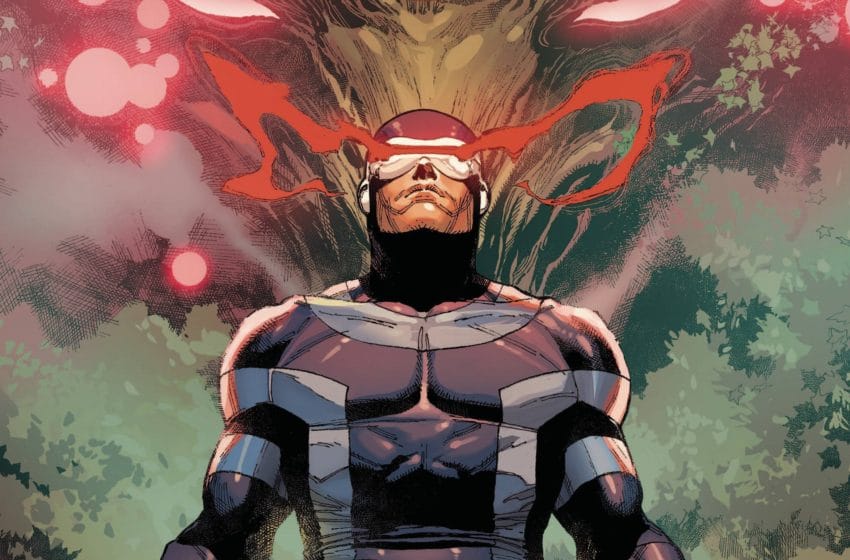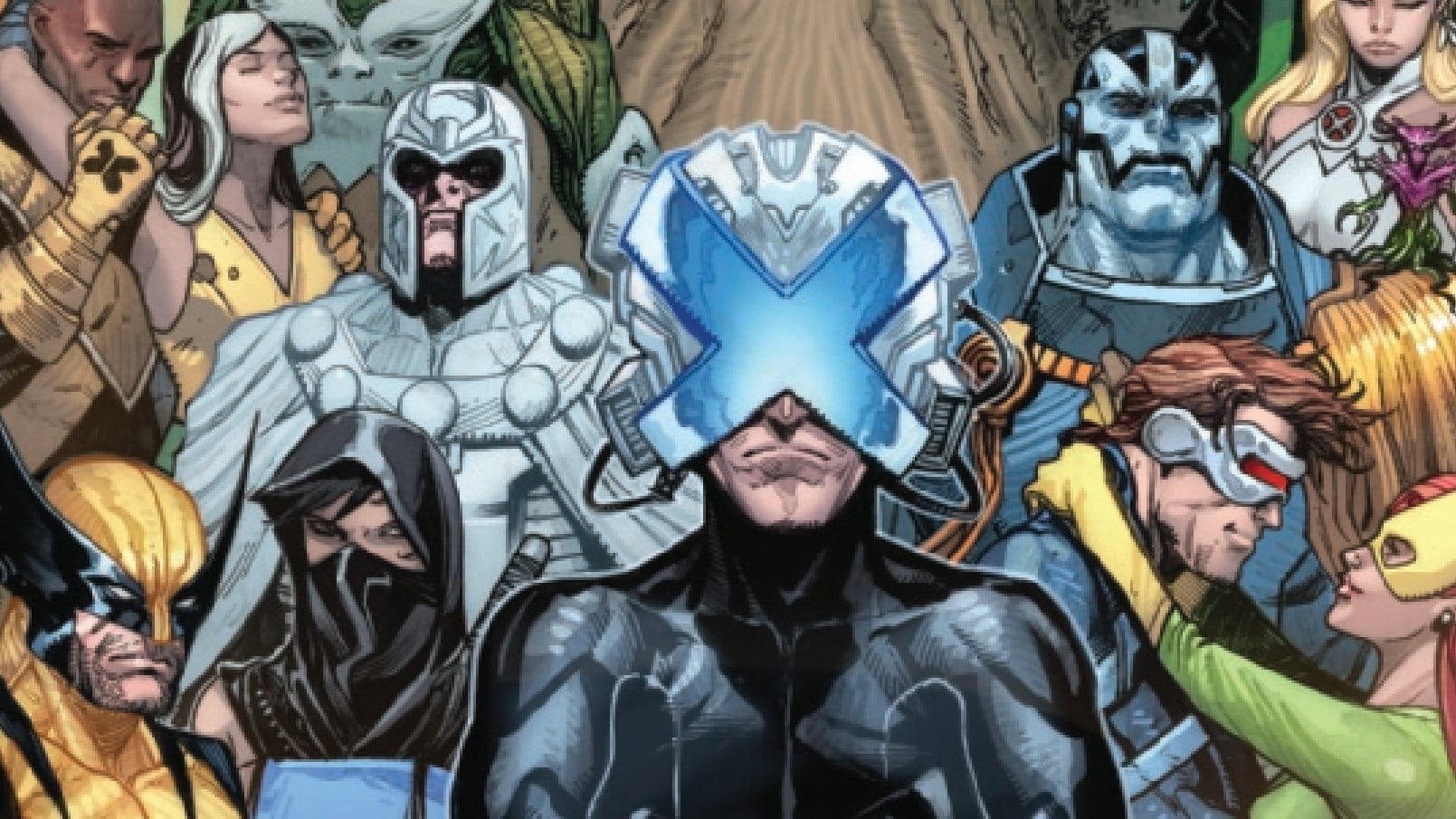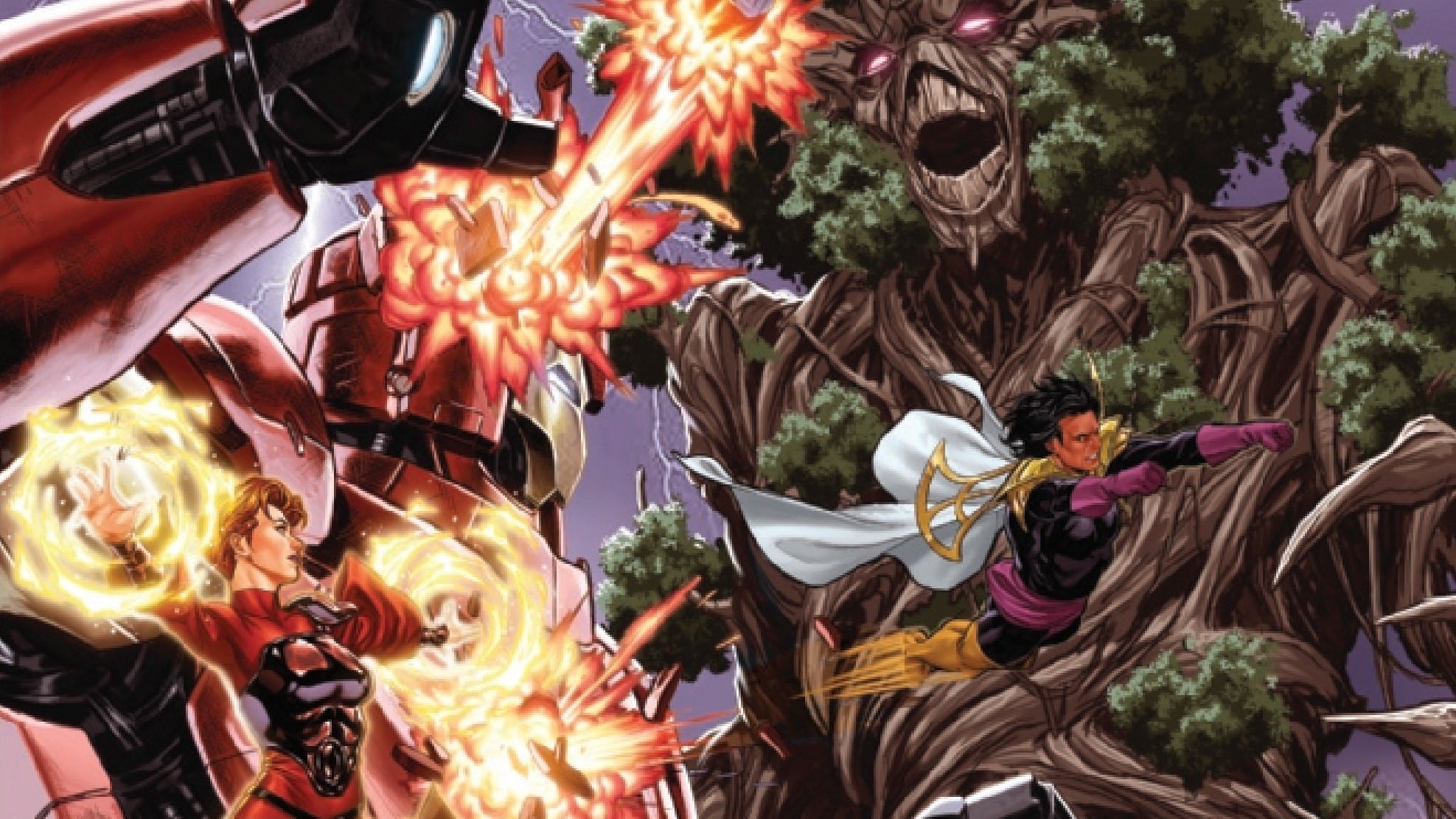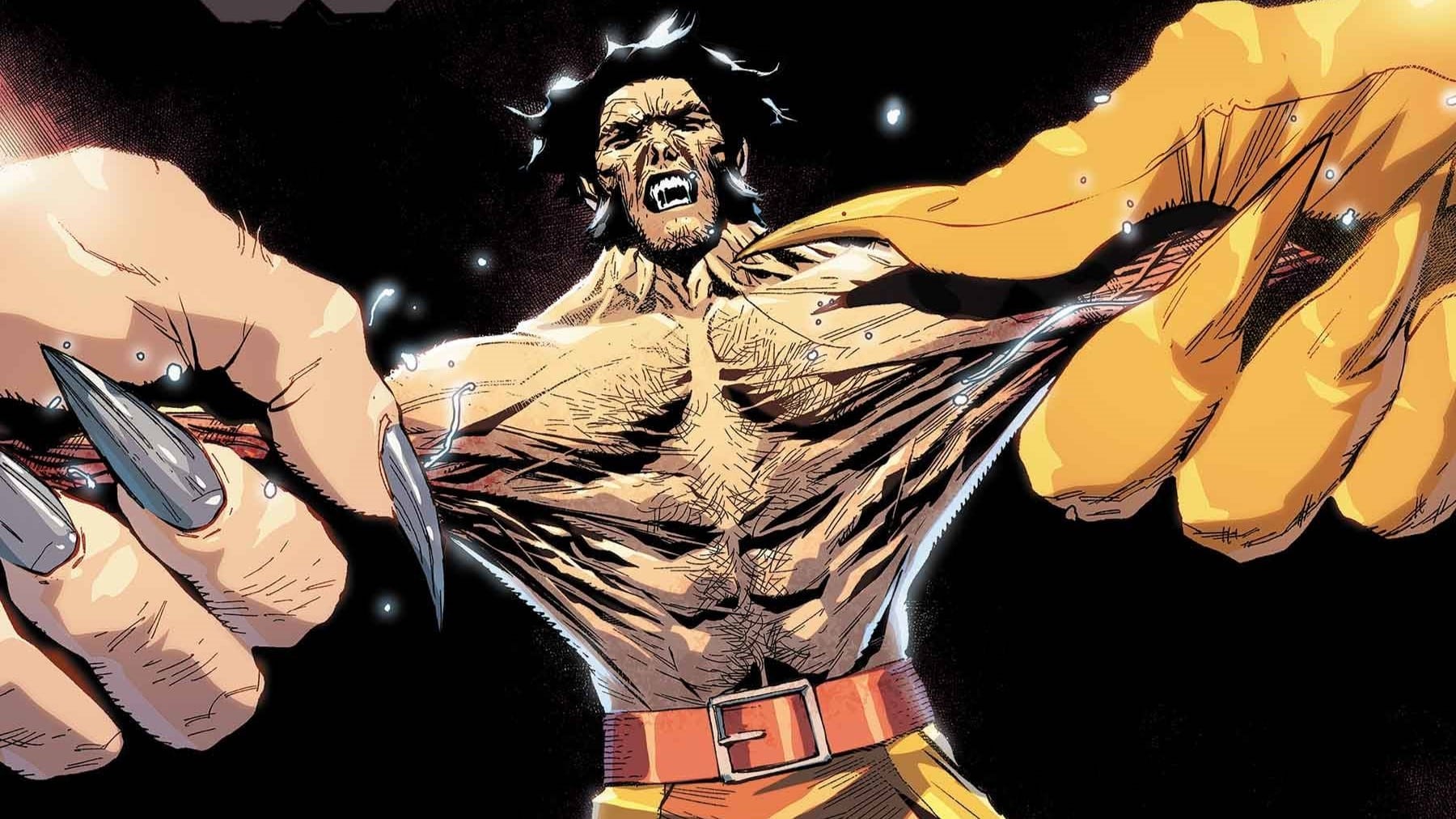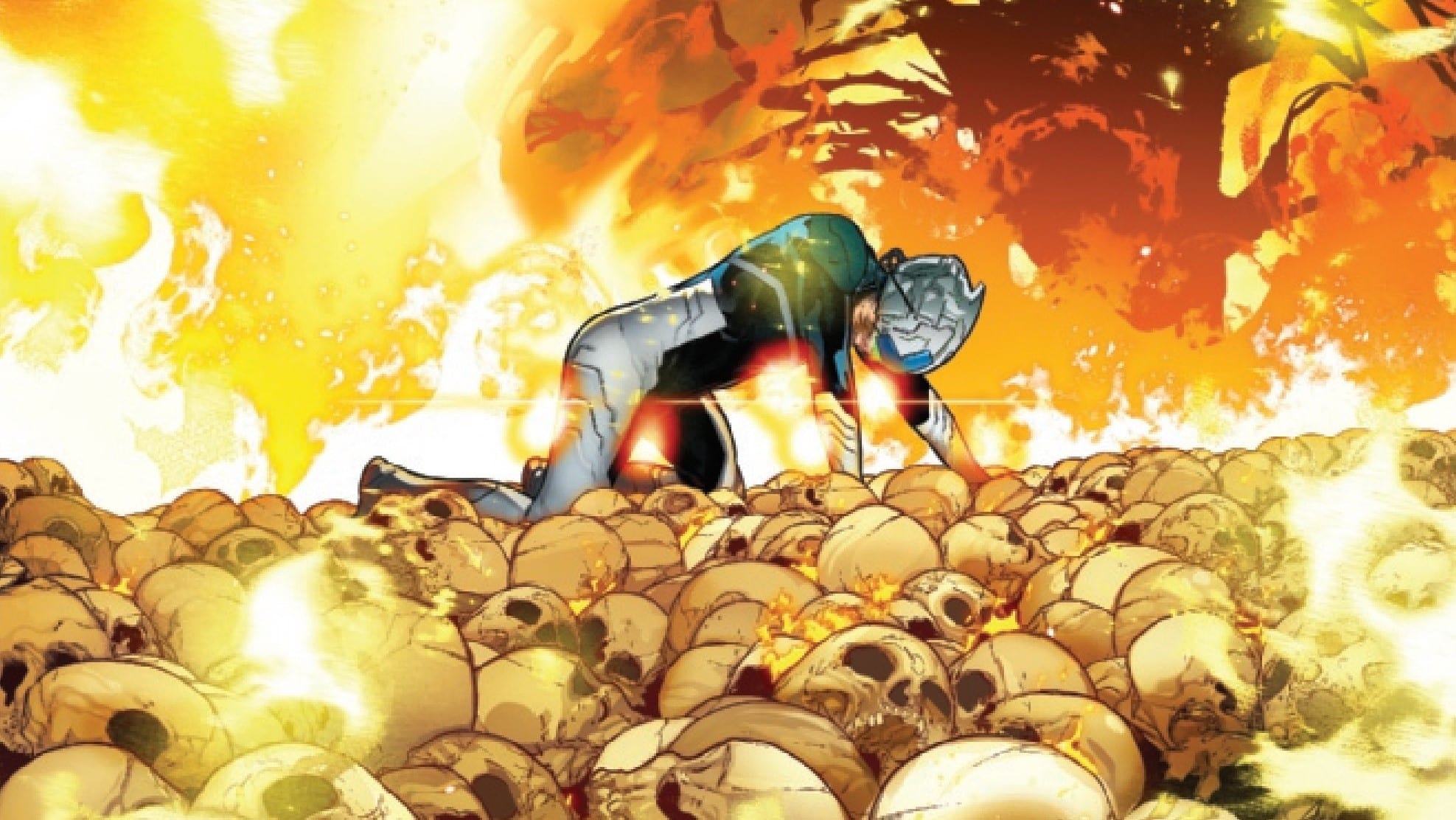The Twilight Sword of the enemy tore the one land asunder. But what now keeps it apart? Jonathan Hickman, Phil Noto, and Clayton Cowles weave a tale of wonder in X-Men #16
Chris Eddleman: Rob, it’s been a long war. 22 issues, to be precise. But there is a time for war, and a time for peace, a time for swords, and a time for big ol’ talking issues. That’s not to detract from this week’s installment, as I found it quite fascinating and immediately wanted to discuss it with you further. Dawn has given way to day, and here comes the Reign.
Robert Secundus: Over all the earth/ RoX reigns on high/ Every demon world/ Every sword tournie/ But my one request/ RoX my only aim/ Is that you’d reign in me again!
Is that…
Is that anything? [Ed. note: It is everything]
GenetiX Drift

CE: Rob, I can’t believe it. At long last, after having to *gasp* learn about other things in order to talk about X-Men, we’re finally back to things that I can actually speak with some intelligence on. It’s time for a little biology discussion. But I get ahead of myself. This issue starts with a parallel scene, lovingly rendered by Phil Noto, to X-Men #2, where Rachel Summers, Cable, and Cyclops view the reunification of Arakko and Krakoa. But unlike Dolly and Kenny, these are not islands in the stream as it were, and they do not become one again. I guess all this sword stuff was for nothing.
RS: I have set aside my wicked pack of cards and I’ve drawn some punnett squares. I am prepared for some biological knowledge.
CE: Alright, so, Krakoa and Arakko no longer seem to want to join together because they’ve become very different over the incredibly long period of time that they’ve been apart. Now while I could remark that this scene with hobbitish Doug being picked up by an entish Krakoa and led to meet with his former other half, I will get a little deeper into the biology in play. So when a species becomes separate from itself, in the real world this usually means geographically in some way, we have two forces at play: genetic drift and natural selection. Genetic drift describes how a population goes through neutral mutations just due to length of time. However, natural selection refers to differences in genetics that are selected for by the population’s environment. These two forces lead to what is called speciation, the creation of a new species from a previous one. Now while we don’t have that at play here, the separate evolution of Krakoa and Arakko have created two very different populations, that can only ostensibly be called the same people at this rate. I was pretty excited reading about this, since Hickman had some interest in biological concepts in House of X/Powers of X. He takes it in a bit of cultural direction too, which I find kind of cool. Thoughts on this?
RS: There’s a parallel here in linguistics I want to talk about, but first I’ve got a couple of bio-questions. First of all, the timescale: is this enough time for a species to diverge into two, and is there a real-world example on this scale we can look at for comparison? When it comes to evolution, I often have a hard time of grasping scale since we’re normally talking huge numbers.
CE: Well, it really depends on generation time. In terms of complex animal life, 100 generations was kind of an average, which is roughly 2500 years in human time scale. So…yes, possibly. However, remote humans have not speciated in that time, so also probably not? A good example of rapid speciation is apple maggots, which are CURRENTLY speciating and started roughly 150 years ago with the introduction of apple trees to North America. Prior to that they only ate hawthorns. Now there are two sub groups that eat on apples and hawthorns respectively and only generally breed within their subgroup. However, physical barriers and hybridization are pretty surefire ways to cause speciation. Hybridization, when a species is created from two separate ones, often happens in plants, which are more tolerant of multiple copies of chromosomes. We haven’t observed a ton of nonhydrization speciations though, so this is kind of a tough question. It usually takes a really long time.
RS: And we know that mutants often live longer than humans, and that many mutants we’ve seen from Arrako live much longer than humans— so it makes sense then that a kind of speciation is affecting them, that they have drifted somewhat apart, but remain still homo superior.
So, the other thing I wanted to talk about is, again, linguistic parallels here. Just as biology changes over time when populations are separated, so too does language, and problems of language are emphasized throughout this issue. The way Doug talks about the linguistic gap brings to my mind an interesting problem: what comes first, thought or word? Language or ideology and philosophy? Do we think about things and then come up with words for those thoughts, or does our vocabulary restrict our ability to think? In this issue, more specifically, we wonder if a warlike society has created a language that makes it difficult for them to just talk to a peaceful society, or if the language that has emerged from their history of war makes it difficult for them to think clearly and complexly about peace. The question of whether thought is prior to word or vice versa is an interesting one, and one far too complex to delve into deeply here, but I think it’s a question that is highlighted by this story, and if folks are looking to learn more, this article about the ability to see color and the ability to describe color is a good starting point.
Mankind? How Quaint

CE: So of course we send ⅔ of the diplomacy team to go chat with Arakkoan mutants, meaning Xavier and Magneto since Apocalypse is elsewhere. It’s interesting that they only meet up with Isca, but it makes for an interesting conversation. I’m glad that Hickman finally hammered home the big differences between Krakoa and Arrako, even though the soft mutants vs. the war-honed mutants of a millennia war concept has been hit pretty hard to create a sense of underdogs in our heroes. What do you think about these philosophical differences?
RS: I think they’re pretty terrifying! In three ways: first, the least obvious in this issue, is the continuing lack of any presence of average Arrakoan mutants on page, and their apparent lack of power. These are millions of mutants who were oppressed and imprisoned by the same people that will continue to rule them (even though those people are no longer swearing fealty to a literal demon horde). That’s a whole powder keg. How long until a mutant Nestor Makhno just starts blowing things up? Second: there’s a pretty clear strain of ultra-Darwinism, or some kind of Nietzschean Ubermensch bullshit pervading this society, something like some ideologies we’ve seen in X-Men villains past, but in a new form, as this is Ubermensch ideology in a society that has been able to and wishes to continue to war. Third, and related to the second, is a kind of— I think the best way of phrasing it might be Xenophobia? There’s a snide disdain for anything other here, particularly ideologically other. They can’t even admit the possibility that a different culture— even a culture with the same origin as theirs— might have any validity, value, strength. All of these things spell disaster.
CE: It’s very cool to me, and I’m certain that it’s another of those “long game” plotlines that this crew seems to be serving us. I particularly liked how Magneto seemed to try to be on Isca’s team a little bit while calling Xavier soft, but then even she seemed to think Magneto wasn’t up the task. Isca seemed shocked that humankind could survive in the absence of the mutants (granted, if you believe ORCHIS, the absence of powerful Arrakii mutants was likely something that CAUSED their survival) and still be so weak. It seems as though from her perspective, mutantkind should have wiped them off the map—as you said some ultra-Darwinism. It’s interesting to see Apocalypse as only a representative of an entire credo that exists in a population, a bigger one than Krakoa even. We are presented with the graphic of their council as well, hinting at a separate Arrakoan language in the characters, telling us ALL OF THEM are Omega-levels, and also speaking of a hidden deep state-esque aspect to their council. Do we wanna get wild with speculation?
RS: Oh absolutely I do. I think we jumped to the same basic idea when we saw that redacted set of bars— Arrakko has some kind of Moira of their own. That could mean a few different things: just a figurative Moira, someone ultra-powerful in some way ruling from the shadows, or a literal Moira. It could be Moira IX surviving (and thus changing our fundamental understanding of how her powers work) or even Moira X ruling both quietly (as she had knowledge of Arrako from her previous lives).
CE: Moira would 100% know about Arrako, having met the First Horsemen in that life. Her absence from X of Swords in general was fascinating, and is unlikely to be simply carelessness. I wonder who the other two Night council members would be? Life IX Xorn and Rasputin IV, who were sucked through a singularity?
RS: PERHAPS. Speaking of that council:
Strange Mutants, On a Quiet Council, is No Basis for a System Of Government

RS: Fellow Xavier Files/CXF contributor Zach Rabiroff pointed out to us that this issue seems to be establishing on-page a series of governments that mirror an idea found in ancient Greek political philosophy: the political κύκλος, or cycle of progression/ regression. I’m going to quote Polybius here rather than Plato or Aristotle, because I think he sums up the general ideas fairly concisely:
“We cannot hold every absolute government to be a kingship, but only that which is accepted voluntarily, Six forms of polity, and their natural cycle.and is directed by an appeal to reason rather than to fear and force. Nor again is every oligarchy to be regarded as an aristocracy; the latter exists only where the power is wielded by the justest and wisest men selected on their merits. Similarly, it is not enough to constitute a democracy that the whole crowd of citizens should have the right to do whatever they wish or propose. But where reverence to the gods, succour of parents, respect to elders, obedience to laws, are traditional and habitual, in such communities, if the will of the majority prevail, we may speak of the form of government as a democracy. So then we enumerate six forms of government,—the three commonly spoken of which I have just mentioned, and three more allied forms, I mean despotism, oligarchy and mob-rule. The first of these arises without artificial aid and in the natural order of events. Next to this, and produced from it by the aid of art and adjustment, comes kingship; which degenerating into the evil form allied to it, by which I mean tyranny, both are once more destroyed and aristocracy produced. Again the latter being in the course of nature perverted to oligarchy, and the people passionately avenging the unjust acts of their rulers, democracy comes into existence; which again by its violence and contempt of law becomes sheer mob-rule.” (this is from his Histories, Book VI.4, translated by Evelyn Shirley Shuckburgh).
So you’ve got governments where one person rules, where a group of people rule, and where the populace rule, and you’ve got virtuous and vicious versions of each, in this schema. In Krakoa, we have (ostensibly) an aristocracy— a group of unelected people who rule, but are trying to rule in the favor of the people, and have been selected due to some merit (obviously there are bad people on the council, but at least according to that council they were selected for some meritorious reason). At the very least, the Council has to act with the consent of Krakoa itself. In Arrakko we have an oligarchy where omega-level mutants rule by virtue of that status; that is, they rule by force.
The X-Men now are going to function as a democratic organization— and maybe by positioning a democratic and an aristocratic force within the same society, some kind of tension will help both thrive (or maybe will cause one or both to fall). Behind the scenes we have, of course, Moira, who, as designer of this society and as the one with, we think, some level of power beyond the council, is a kind of monarch— and I think we’re supposed to question which of the two kinds she is. Moira’s absence is the great void of DoX and RoX, and we can only fill that void with our own speculation. I think she’s no tyrant— but I think we’re meant to at least consider the possibility of tyranny here.
CE: Well, also compare this to Arakko, which has a literal confirmed shadow council. Moira as far as we know has kind of left the mutants alone post HoXPoX, only to be seen in a panel when a Cerebro fried in early X of Swords. While we know she has done quite a lot of set up work, it seems as though this Arakkoan shadow group holds quite a bit of power. Vicious vs. virtue again. It’s interesting seeing this progression of governments. Shall mob rule happen at some time? Perhaps when it’s discovered that Moira was pulling some strings. I suppose we shall see Rob. It’s a small detail but, did you like that the Arakkii were also eligible to be X-Men?
RS: Oh absolutely. I was iffy on the whole concept at first— I would prefer that all adult mutants be eligible for the X-Men and that the team shift over time— but that detail was what really sold me on setting the team down into something specific. Over the past, well, two decades I guess? It’s felt like the lead X-Men team is just a Semi-Random Assortment Of Faves. Very rarely for me has it felt like a lineup that organically grew out of the story and felt distinct from other lineups, to the degree that, say, Early Claremont X-Men feel radically different as a lineup from Outback Era X-Men. That’s not a huge flaw, mind you— it’s naturally the case when a team gathers hundreds of members over time. It’s a flaw I also find in lots of recent Justice League and Avengers lineups. I’m rambling. Anyway. I think including the Arakkii, making this a team that will foreground all those cultural tensions, will make it feel really distinct. Again, it’s the detail that got me on board. What did you think? And also: who do you want on the lineup?
CE: I love the Arakkii as a concept, so I’m stoked. So we likely have a guarantee of Jean Grey and Cyclops. I would love one of the Xorns, to be honest. I want weirder X-Men. Get Maggott in there. And it would be really cool to have a Crucible participant too. I want things to get kind weird and mythic. But a lot of my current picks are ineligible due to their membership on the Quiet Council (i.e. Nightcrawler, Exodus).
RS: I would love the Xorns and Maggott on there. And of the Arakkii contingent, give me more Bei!
CE: I enjoyed this issue quite a bit. I’m finding that the quieter plot issues resonate for me the strongest, and while this had nary a punch or sword swing, it was that X-Men stuff that I’ve been craving. I dunno how they get past the superhero rule of “required fights” but I think it allowed for a nice deep breath after X of Swords. Noto also did wonderful line and color work, and some great expressive faces during our now tried-and-true 9 panel Council scenes. Pretty stoked for the future…well not next month but, we’ll see everyone in February!
RS: Noto was absolutely the right choice for this issue. Not only is he really great at making conversations extremely visually engaging, but his colors did a great job of showing the distinctions between two societies both literally and figuratively in Spring and Autumn; these are two societies in moments of change, and one is young, vibrant, and beginning to thrive, while the other is at the end of a long, hard cycle, with aspects that may need to die.
I just want to make things clear here in case people didn’t see our announcements on twitter: we won’t be covering X-Men #17 [Ed. note: For Brett Booth related reasons], but will resume with #18. Cheers, everyone, and, if not a happy New Year, I wish everyone the strength to muddle through somehow.
X-Traneous Thoughts

- Krakoan Reads: TYRANTS
- It’s a toss-up whether or not Kate’s Magen David shows up in an issue. A little more consistency please.
- I like that Exodus is big on nuptial congratulations.
- Arakkii Council Members:
- Isca the Unbeaten: We Know Her
- Idyll: The prophet who went blind after seeing the Amenthan DOOM. A precog on Arakko? Uh-oh.
- Tarn the Uncaring: The mutant who is the leader of the Locus Vile from Hellions
- Ora Serrata the Witness: We haven’t seen yet but the ora serrata is a structure in the human eye.
- Stulgid: ???
- I can’t find any kind of etymology for nearly any close root to what we see here. The closest thing I can think of is the Greek storge, a kind of love.
- Lodus Logos: We haven’t seen yet but Logos is Greek for “word” and lodus could mean a few things or not? Lodos is Turkish for a southwestern wind, ludus is Latin for “game or sport.”
- Logos can be a few things in Greek— reason, discourse, speech, proportion, and, of course, in Christianity, God. John 1: 1: In the Beginning was the Word [the logos], and the Word was made flesh and dwelt among us.
- “Lod” as a root has interesting etymologies in a few languages; in Old Norse it can mean fate, or lots (as in “draw lots); in Danish and Old Swedish it can refer to lead, or weights; in Old Polish and in Lower Sorbian it can mean Ice.
- The Ice God? The Word of Fate? Lots of possibilities.
- Lactuca: We haven’t seen yet but this is a genus name for lettuce.
- Sobunar: We haven’t seen yet but this is the name of an ancient settlement in Bosnia.
- Arakko: The whole dang island
- Redroot: Trapped in a bottle in Otherworld
- Vote 4 Glob
- Update: This is Robert Secundus writing after a reader, someone educated in linguistics, pointed out that the linguistic idea I referred to in the article, known as the Sapir-Whorf Hypothesis or Linguistic Relativism, has bene debunked. While I do still believe it’s an idea that’s very much influencing this issue, I gave the false impression that it was a theory of possibly comparable validity to Darwinian species drift, and that’s simply not the case. If you would like to read a quick intro to the debunked theory, you can do so here.

